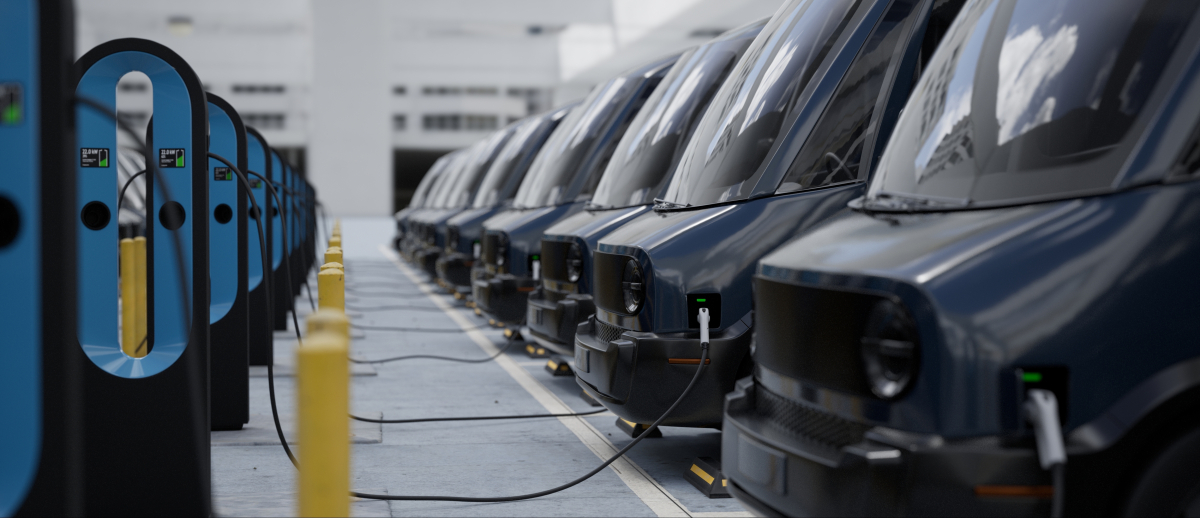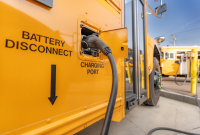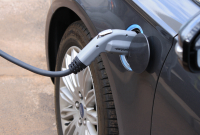Support strong Canadian climate journalism for 2025
There has been much chatter about electric vehicles. Are sales going up or down? Should we put tariffs on imports? How much money do they save? But these conversations have an asterisk: they’re about passenger EVs — the cars we drive to work or soccer practice or take on road trips.
But passenger cars are just some of the vehicles on our streets. And from a pollution perspective, they’re only part of the problem. At least 37 per cent of transport emissions in Canada come from commercial vehicles, such as delivery vans, buses, big rigs, and garbage trucks. And in all the debate over EVs, these often higher-polluting buses and trucks remain largely forgotten. A new report from Clean Energy Canada, released today, dives into this overlooked sector and maps out a package of policies that can get it onto a cleaner path.
Taking action has major upsides. Not only can it make a sizable dent in Canada’s emissions, but it could also be a boon for our homegrown manufacturing industry. The first fully-electric vehicle to ever roll off a Canadian assembly line was a delivery van (GM’s Brightdrop Zevo 600). And there are no less than seven clean bus and truck manufacturers headquartered in Canada. That doesn’t even include other players in the space, like hydrogen fuel cell manufacturers.
Despite its manufacturing prowess, Canada is firmly at the back of the pack when it comes to adoption. Just two per cent of new trucks and buses sold in Canada in 2023 were zero-emissions, compared to nine per cent globally. By failing to put our homemade zero-emission vehicles on the road, we’re putting Canadian companies at a disadvantage and limiting their capabilities to scale up and export to a large and growing global market.
But more than that, slow adoption is also impacting Canadians’ health. An enormous 15,300 premature deaths per year are linked to air pollution, with vans, trucks, and buses having an outsized impact. In fact, every local delivery truck electrified is the equivalent of more than five households adopting EVs. With poor air quality primarily affecting the most vulnerable in our population, such as children and seniors, it’s a serious problem in need of a serious solution.
Thankfully, there are a number of things governments can do to accelerate the deployment of cleaner trucks and buses. These include purchase incentives to reduce the upfront cost for fleets and operators, support for charging, and regulations that compel manufacturers to sell more zero-emission commercial vehicles.
The latter is especially important to improve supply. While a new Clean Energy Canada catalogue published earlier this year showcased the more than 150 zero-emission trucks and buses available for sale in Canada today, wait times can be up to three years for some models, delaying fleets’ ability to decarbonize.
Some of these solutions are already in place, with the federal government and certain provinces farther down the road than other provincial governments. But there’s much more to be done to get enough clean trucks and buses on the road. Luckily, we can look to other jurisdictions for inspiration.
California has the highest zero-emission truck and bus sales in North America with an impressive 17 per cent market share (excluding transit buses), largely thanks to an effective set of policies, including a sales mandate. And the EU has recently introduced some of the most ambitious heavy-duty vehicle regulations in the world, limiting the amount that trucks and buses can pollute.
Without these actions and more, it will be very hard to fight climate change — both here in Canada and around the world. In fact, BloombergNEF recently indicated that the world’s medium- and heavy-duty vehicles are not on track to hit net-zero by 2050 and rapid policy intervention is needed.
With delivery vans, school buses, and trucks ever-constant in our neighbourhoods, let’s strive for cleaner air — for the climate and for our communities.
Joanna Kyriazis is the director of public affairs and the transportation lead at Clean Energy Canada. She previously worked as a management consultant helping businesses identify and manage climate risks and opportunities and as a lawyer advising governments and industry on climate and energy law.
Keri McNamara is Clean Energy Canada’s manager of reports and outreach. Before starting at Clean Energy Canada, she worked in the U.K. as a freelance science communicator. Keri has a background in research, which includes a PhD in physical volcanology from the University of Bristol. Along with researching volcanoes, Keri worked as a writer for several research organizations and magazines, often covering issues related to climate science.







Comments
How fast can we make them, and how fast can we pay - they cost triple what a diesel bus costs. It pays back on operating, so it's still a good move, given financing, which is what governments can do well and cheaply.
We should move to them at speeds that toss out diesel buses still good for purpose, and find other uses for them. (At the moment, all would be turned into informal housing, yoicks.) But that presupposes building them faster than old ones wear out, about 5% of fleet per year?